Optical Patient Interface in FS Laser Assisted Cataract Surgery
Medical Industry
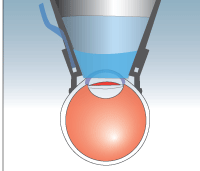 This paper compares two optical patient interface designs used for femtosecond laser-assisted cataract surgery. It shows a marked improvement in laser capsulotomy using the liquid optical immersion interface. With this design the corneal folds are eliminated.
This paper compares two optical patient interface designs used for femtosecond laser-assisted cataract surgery. It shows a marked improvement in laser capsulotomy using the liquid optical immersion interface. With this design the corneal folds are eliminated.
Integrated Optical Coherence Tomography for Cataract Surgery
Medical Industry
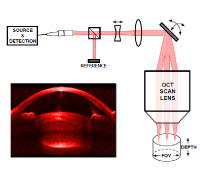 An integrated optical system including OCT imaging and a femtosecond laser allowed for exact placement, precise sizing, and shaping of the cutting patterns during surgery to remove cataracts. The optical system design and analysis was done by David Angeley and is the basis for Optimedica's Catalys product.
An integrated optical system including OCT imaging and a femtosecond laser allowed for exact placement, precise sizing, and shaping of the cutting patterns during surgery to remove cataracts. The optical system design and analysis was done by David Angeley and is the basis for Optimedica's Catalys product.
"Femtosecond Laser-Assisted Cataract Surgery with Integrated Optical Coherence Tomography", www.ScienceTranslationalMedicine.org, Vol 2 Issue 58, November 2010
Optical Delivery System and Methods of Providing Adjustable Beam Diameter, Spot Size and/or Spot Shape
Medical Industry
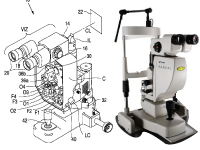 This design is the basis for the Pascal photocoagulator product. The product is used to treat diabetic retinopathy and age-related macular degeneration. The design details a method for producing adjustable beams, spot sizes and spot shapes on a target. (e.g. a patient's eye). In performing these treatments it is advantageous to be able to use beams of dirrerent sizes depending on the particular type of treatment and the condition of the patient.
This design is the basis for the Pascal photocoagulator product. The product is used to treat diabetic retinopathy and age-related macular degeneration. The design details a method for producing adjustable beams, spot sizes and spot shapes on a target. (e.g. a patient's eye). In performing these treatments it is advantageous to be able to use beams of dirrerent sizes depending on the particular type of treatment and the condition of the patient.
Method and Apparatus for Automated Placement of Scanned Laser Capsulorhexis Incisions
Medical Industry
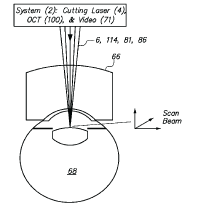 This patent discusses the optical design configurations for the patient interface of a laser assisted cataract surgery. The optical system design and analysis was done by David Angeley and is the basis for Optimedica's Catalys product.
This patent discusses the optical design configurations for the patient interface of a laser assisted cataract surgery. The optical system design and analysis was done by David Angeley and is the basis for Optimedica's Catalys product.
Intraocular Lens
Medical Industry
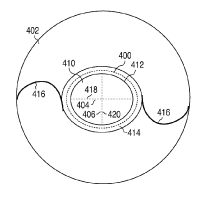 This patent discusses the optical design configurations for the patient interface of a laser assisted cataract surgery. The optical system design and analysis was done by David Angeley and is the basis for Optimedica's Catalys product.
This patent discusses the optical design configurations for the patient interface of a laser assisted cataract surgery. The optical system design and analysis was done by David Angeley and is the basis for Optimedica's Catalys product.
Off Axis Alignment System for Scanning Photolithography
Semiconductor Industry
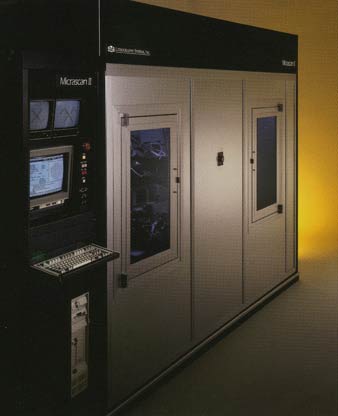 This is an alignment system used in semiconductor manufacturing. It is the core component used to align a mask containing a circuit pattern to a wafer during a scanning sequence. This design improved detection of wafer alignment marks independent of various process wafer structures. The design was implemented in the Micrascan II photolithographic machine.
This is an alignment system used in semiconductor manufacturing. It is the core component used to align a mask containing a circuit pattern to a wafer during a scanning sequence. This design improved detection of wafer alignment marks independent of various process wafer structures. The design was implemented in the Micrascan II photolithographic machine.
Optical Quality Linear Grating with Potential for Biosensing Applications
CBRN Research - Government
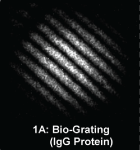 Paper detailing research focused on bio-photonics and its application in biosensing detection techniques. We describe a process to fabricate an optical-quality grating using protein as the biomaterial building block. The resulting grating is capable of generating high-quality diffraction. We demonstrate how such a biograting has the potential for the detection of small amounts of unlabeled biological analyte.
Paper detailing research focused on bio-photonics and its application in biosensing detection techniques. We describe a process to fabricate an optical-quality grating using protein as the biomaterial building block. The resulting grating is capable of generating high-quality diffraction. We demonstrate how such a biograting has the potential for the detection of small amounts of unlabeled biological analyte.
"Fabrication of an optical-quality linear grating of immunoglobulin G proteins by microcontact printing and demostration of potential biosensing applications", Optical Engineering, Vol. 45(4), 043402, April 2006
Light Beam Delivery System with Power, Wavelength and Spot Size Control
Medical Industry
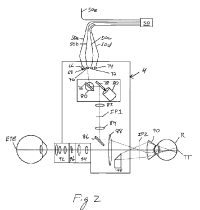 A beam delivery system for treating target tissue that includes an input for receiving a light beam, a variable attenuator for providing variable attenuation of the light beam, a power and wavelength detection assembly, a spot size adjustment assembly , and a controller. The power and wavelength detection assembly measures the power level of the beam, and detects when unwanted wavelengths are present in the light beam. The spot size adjustment assembly selectively feeds the beam through defferent optical fibers to achieve different spot sizes of the beam.The controller controls the variable attenuator, the power and wavelength detection assembly, and the spot size adjustment assembly to achieve the desired power and wavelength, and the beam spot size.
A beam delivery system for treating target tissue that includes an input for receiving a light beam, a variable attenuator for providing variable attenuation of the light beam, a power and wavelength detection assembly, a spot size adjustment assembly , and a controller. The power and wavelength detection assembly measures the power level of the beam, and detects when unwanted wavelengths are present in the light beam. The spot size adjustment assembly selectively feeds the beam through defferent optical fibers to achieve different spot sizes of the beam.The controller controls the variable attenuator, the power and wavelength detection assembly, and the spot size adjustment assembly to achieve the desired power and wavelength, and the beam spot size.
Asymmetrical Laser-Resonator Having Solid-State Gain-Medium Symmetrically Filled by Resonator Mode
Medical industry
 A laser resonator design for Er:YAG gain medium that optimizes output power for dermatology field. The technique can be used for other solid state gain media for various medical applications.
A laser resonator design for Er:YAG gain medium that optimizes output power for dermatology field. The technique can be used for other solid state gain media for various medical applications.
Scanner Laser Handpiece with Shaped Output Beam
Medical Industry
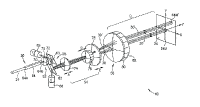 The design of a handpiece to deliver laser radiation in laser tissue treatments. The handpiece design shapes a laser beam and scans the shaped beam over tissue to be treated.
The design of a handpiece to deliver laser radiation in laser tissue treatments. The handpiece design shapes a laser beam and scans the shaped beam over tissue to be treated.
System and Method for Detecting Presence of Analytes Using Gratings
CBRN Research - Government
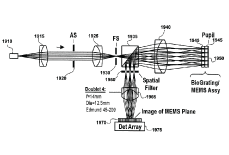 This design was initiated in response to a need to detect the presence of trace amounts of chemical and biological warfare agents quickly and reliably. This design is a technique to improve the sensitivity, speed and reliability of sensors. Specifically, this design details a technique for detecting phase changes in diffracted light when the light is incident on at least two diffraction grating sections.
This design was initiated in response to a need to detect the presence of trace amounts of chemical and biological warfare agents quickly and reliably. This design is a technique to improve the sensitivity, speed and reliability of sensors. Specifically, this design details a technique for detecting phase changes in diffracted light when the light is incident on at least two diffraction grating sections.
US Patent 7,445,938 B2 General Dynamics Advanced Information Systems, Inc.
Scanning Laser Handpiece with Shaped Output Beam
Medical Industry
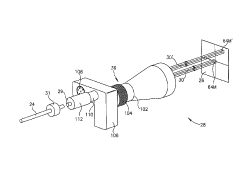 The design of a handpiece to deliver laser radiation in laser tissue treatments. The handpiece design shapes a laser beam and scans the shaped beam over tissue to be treated.
The design of a handpiece to deliver laser radiation in laser tissue treatments. The handpiece design shapes a laser beam and scans the shaped beam over tissue to be treated.
System, Method and Apparatus for Providing Uniform Illumination
Medical Industry
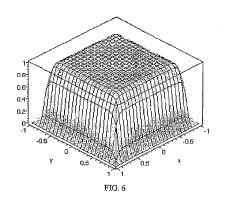 This relates to methods and devices useful in laser surgical and diagnostic techniques in the opthalmic arena. The design presents a mehod for providing uniform illumination on the retina to prevent damage to photoreceptors in the eye due to heat and uneven beam energy profile.
This relates to methods and devices useful in laser surgical and diagnostic techniques in the opthalmic arena. The design presents a mehod for providing uniform illumination on the retina to prevent damage to photoreceptors in the eye due to heat and uneven beam energy profile.
Grating Sensor
CBRN Research - Government
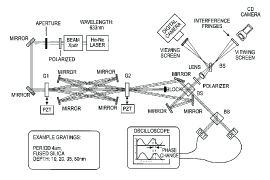 This patent details an optical grating-based sensor, sensing system and method of use. It is designed to provide a fast, accurate, and reliable sensor to chemical and biological analytes. The analyte recognition material may be an antibody, nucleic acid, lectin or other substance. The sample may be obtained from a mammal, including a human, a plant, or the environment.
This patent details an optical grating-based sensor, sensing system and method of use. It is designed to provide a fast, accurate, and reliable sensor to chemical and biological analytes. The analyte recognition material may be an antibody, nucleic acid, lectin or other substance. The sample may be obtained from a mammal, including a human, a plant, or the environment.
US Patent 7,027,163 B2 General Dynamics Advnaced Information Systems, Inc.
Scanning Laser Handpiece with Shaped Output Beam
Medical Industry
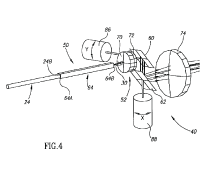 Yet another patent on a scanning laser handpiece for use in the medical laser field.
Yet another patent on a scanning laser handpiece for use in the medical laser field.
Scanning Laser Handpiece with Shaped Output Beam
Medical Industry
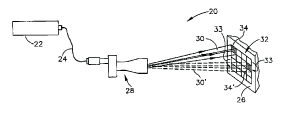 Yet another patent on a scanning laser handpiece for use in the medical laser field.
Yet another patent on a scanning laser handpiece for use in the medical laser field.
Zoom Handpiece for laser Surgery
Medical Industry
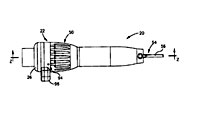 This is a handpiece for delivering laser radiation form a solid-state laser to biological tissue for the purpose of making a surgical incision therein. The handpiece is designed to provide a selectively variable spot size of laser radiation at an incision site at a fixed distance from the handpiece.
This is a handpiece for delivering laser radiation form a solid-state laser to biological tissue for the purpose of making a surgical incision therein. The handpiece is designed to provide a selectively variable spot size of laser radiation at an incision site at a fixed distance from the handpiece.
Illumination and Imaging design for medical devices
Medical Industry
We built a relatively small and inexpensive proof-of-principle system that is able to automatically detect and treat common telangiactasia in near real-time. Our device embodies different concepts with regard to illumination, image capture, vessel detection, beam delivery and laser scanning. The details of these aspects are presented in this paper.
Diffraction Grating for Biosensing
CBRN Research - Government
The objective of this paper is to describe the optical transduction aspect of a unique potential biosensing technology. The optical detection concept finds its origins in the semiconductor industry. The detection platform is a derivative of a lithographic overlay alignment method, currently used in lithographic projection systems, which can detect lateral shifts of semiconductor wafer features down in the nanometer scale range 1. Ultimately, this technique is to be merged with the ability to create optical quality grating structures out of biological materials, i.e. a ‘bio-grating’, with the ability to detect small amounts of unlabeled analyte.
An Achromatic Handpiece and Laser Delivery Device
Medical Industry
A fiber handpiece developed for dermatological and vascular medical applications is discussed in detail. The handpiece can be zoomed such that it can deliver output spot diameters ranging from 2mm to 1 0mm when connected to a fiber optic with a 365um diameter core size. The spot diameter is invariant at the treatment plane over a continuous wavelength spectrum between 532nm to 1064mn and exhibits a spot diameter variation of less than 10% over the depth of focus of +1- 5mm at each spot size setting. In these regards, the handpiece can be considered 'achromatic' and 'telecentric'. Details of the optical design, the design process, and important delivery device considerations are presented.
"An achromatic handpiece and laser delivery device for cutaneous medical application", SPIE Vol.3907 Lasers in Surgery: Advanced Characterization, Therapeutics, and Systems X, pp.151-162,2000
Erbium:YAG laser resonator design
Medical Industry
In this paper, a technique is presented which reduces this damage susceptibility problem of the flat-flat configuration. This solution involves modifications to the resonator that increase the spot size at the HR relative to the spot size at the OC but the symmetrical fill ofthe gain medium as created by the flat-flat geometry is maintained. In this way, the advantages of the flat-flat cavity are kept while the disadvantage of laser-induced damage is reduced.
"Erbium:YAG laser resonator which reduces laser damage to the cavity high reflector", SPIE Vol.3929 Solid State Lasers, pp.55-65,2000
CBRN Planning and Response
CBRN Research - Government
There is a need to effectively manage large scale overwhelming events such as those presented by Chemical, Biological, Radiological, Nuclear (CBRN) and natural disasters. We have developed an integrated approach to support decision-making efforts within overwhelming CBRN events. The end product is called the Actionable Knowledge Report (AKR). This tool provides fused knowledge and analysis summaries focused on needs of specified end-users in a near-real time, web-based, multi-level secure, common operating picture environment.
"CBRN Planning and Response:Collecting, Analyzing, and Using Actionable Knowledge", Defense Transformation and Network-Centric Systems, Proc. of SPIE Vol. 6249, 624901, 2006